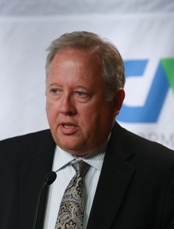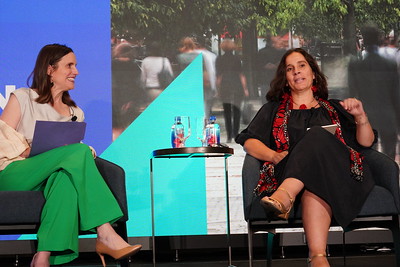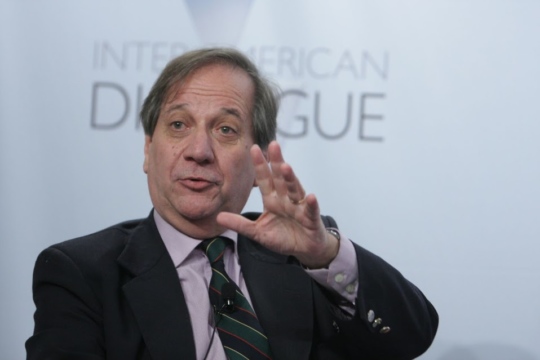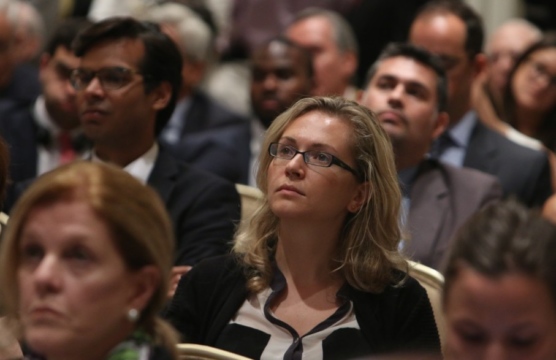
An Americas Agenda for the World
The Inter-American Democratic Charter is a watershed in how the region understands democracy.
For the final session of the 2023 CAF Conference from June 1-2, 2023, the Inter-American Dialogue, CAF-Development Bank of Latin America and the Caribbean, and the Organization of American States brought together Dr. Rebecca Bill Chavez, president & CEO of the Inter-American Dialogue and Antonia Urrejola, former foreign minister of Chile for an exchange titled, “Bolstering Democratic Governance Through Foreign Policy.” Chavez and Urrejola discussed the challenges in implementing consistent foreign policy on human rights and the overall role of countries in Latin America and the Caribbean in curbing democratic backsliding throughout the region.
The conversation began with a reference to the previous session on women’s empowerment, with Chavez asking Urrejola about her own experience in seeking to appoint more women ambassadors during her time as Chile’s foreign minister. Urrejola highlighted some of the obstacles she faced in this endeavor with an anecdote. When she approached qualified candidates about ambassador positions, she said, all men said yes on the spot. Meanwhile, all women she called first asked Urrejola why she had chosen them, and then they stressed the need to discuss the offer with their partner and families before accepting. Three of the women ultimately declined because of care duties, showcasing some of the barriers to women’s participation and representation at the highest levels of political office.
Diving into the session’s topic, Chavez outlined that international human rights are based on the idea that they are universal and should be protected and upheld by all, but it is difficult to find a country in the region that has implemented a consistent foreign policy that holds everyone – regardless of ideology – to the same standards. Chile, Chavez pointed out, seems to be an exception to this rule, at least under President Gabriel Boric. Urrejola remarked that Chile is different for several reasons. The first is because of its own history with a dictatorship that committed human rights violations, memories that are very much present in Chilean society today, and another is Boric’s own commitment to human rights, including in his administration’s foreign policy. A major obstacle in this regard, Urrejola said, is that international relations hinge on a certain level of pragmatism, and implementing a foreign policy that consistently advocates for the respect of human rights regardless of ideology comes with a cost. Speaking out against certain leaders implies a political calculation, Urrejola added, because it could have a real impact not only on the bilateral relationship between Chile and the accused’s country, but also on Chile’s place within regional blocs more broadly.
Chavez asked about the case of Nicaragua, where the Ortega regime’s abuses have been so extreme that multiple governments from across the political spectrum have criticized the situation there – with Chile being the first to do so. Urrejola replied that the situation in Nicaragua has continued to worsen amid an environment of persecution not only of political opponents but of virtually all associations, including the Red Cross, language academies, and even odontologist groups. “Any gathering of people … is seen as a threat,” Urrejola said, adding that the Nicaraguan case is especially complex because the regime no longer cares about the political and economic consequences of its actions. A major challenge in Nicaragua, Urrejola added, is the lack of a united opposition, which was key for Chile’s transition to democracy in the 1990s. In this regard, the tools of the inter-American system should be upgraded to better respond to democratic decline in Nicaragua and elsewhere in the region, Urrejola said. One way to do this is through early warning systems and public statements that call attention to issues of democratic erosion, but a missing part of this is more action on the part of member states. This should also be coupled with civic education programs on the importance of democracy and democratic values, especially among the youth, she added.
Chavez closed the session by circling back to Chile’s feminist foreign policy, another priority of the Boric administration. Urrejola related that, during her time as Chile’s foreign minister, she sought to approach foreign policy through a transversal gender lens, taking into account the differentiated gender impacts of foreign policy issues like migration and peace-building processes. A feminist foreign policy also involved improving gender representation within Chile’s own diplomatic forces. For example, under her leadership, Chile doubled the number of women ambassadors – from 14 to 27 – in one year. But it goes beyond that, Urrejola said, and must incorporate policies such as affirmative action at international organizations to facilitate underrepresented groups’ inclusion at the multilateral level, as well. A transversal gender lens must be a part of every aspect of foreign policy, Urrejola concluded, precisely because these policies have specific impacts on women.
The Inter-American Democratic Charter is a watershed in how the region understands democracy.
Summary of the XIV Annual CAF Conference
Regional integration, social inclusion, and the need for a more competitive business climate—discussed at the XVIII Annual CAF Conference
 CAF - Development Bank
CAF - Development Bank

 Video
Video